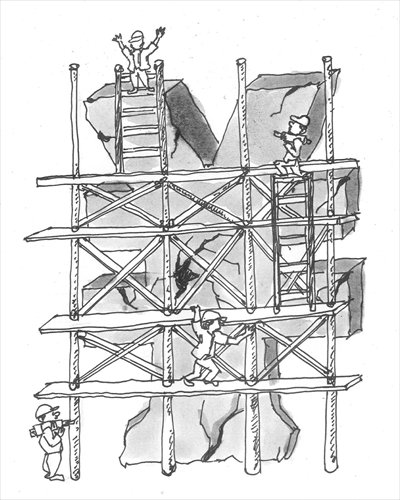HOME >> BUSINESS, OP-ED
China still has strong economic fundamentals to achieve long-term, sustainable growth
Source:Global Times Published: 2015-7-26 22:43:01

Illustration: Luo Xuan/GT
There have been a lot of discussions in recent months about whether China's economy is heading for a collapse given the weak industrial output and volatility in the country's equity market.
But contrary to some observers' grim views about China's economy, I have full confidence in its outlook. There is a good foundation for economic development in the country and the economy is likely to expand sustainably in the coming years. This is not only my personal opinion, but one that is held by most analysts and government officials in Russia.
Russia's economy shrank by 4.7 percent in the second quarter from a year earlier, and the country needs large-scale investment in sectors such as high-tech manufacturing, financial services, education and medical industries to boost economic development and speed up its process of modernization. China faces less difficulties in this area because the country has plentiful financial resources as the world's second-largest economy.
China's economic growth in the second quarter was unchanged from the first quarter at 7 percent year-on-year. This may be the weakest level of growth since the global financial crisis, but in my view it is still a good result for the Chinese economy, given that it faces downward pressure in both the domestic and overseas markets. One of the factors behind the current growth level is China's economic restructuring, which may have a negative impact on short-term expansion but can help to boost growth in the long term. Another key factor is the sluggish global economic recovery, especially in the country's main trading partners such as the EU.
If there are widespread concerns in the global market over the Chinese economy, it's mainly because the country was once a shining star with double-digit GDP growth levels.
To spur the slowing economy, China's central bank has eased monetary policy since November by cutting interest rates and banks' reserve requirement ratio. But monetary policy easing is not a miracle cure for all problems, even though it's a very important tool of macroeconomic regulation. China should focus more on boosting its long-term growth potential by investing in human capital and improving labor productivity.
There has also been debate about whether China should release more liquidity and launch a quantitative easing (QE) program. I am not sure it's possible for China to roll out such a program, because there is a greater likelihood of QE leading to inflation in a relatively closed financial system that has barriers to cross-border capital flows. The US and Japan have more open financial systems, so inflation risks from QE programs in those countries was relatively low.
More important than easing is China's ongoing economic reform. Some observers have said the pace of China's economic reform has been slower than expected, but the country should not be disturbed by such opinions and should follow its own pace of reform in order to avoid disruptions in its economy. In the case of yuan exchange rate reform, it could be dangerous if the reform goes too fast. Moving to a free-floating exchange rate regime should happen step by step, which will help to protect Chinese exports from enormous losses caused by yuan appreciation.
The yuan has the potential to become a global reserve currency, without having a negative impact on exports and the overall Chinese economy at the same time.
Meanwhile, Russia is also making active economic adjustments to develop and restore its economy. The economies of Russia and China can complement each other, as Russia is a country that currently lacks sufficient investment, while Chinese enterprises are eager to invest and expand overseas. This could lead to greater economic cooperation between the two countries.
Pakistan, Mongolia, and other central Asian countries are also likely to open their markets to Chinese investment as part of China's "One Belt, One Road" initiative. It is a global initiative that can benefit all the economies involved, and potential investment from China will be important for the region's development.
The article was compiled by Global Times reporter Hu Weijia based on an interview with Sergey K. Dubinin, former governor of the Russian central bank. bizopinion@globaltimes.com.cn
Posted in: Expert assessment, Biz Comments